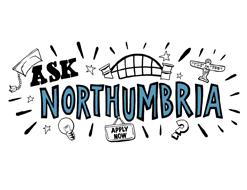-
Study
-
Quick Links
- Course Search
- Fees and Funding
- Unlock Your Potential
- Still time to Apply
- Higher and Degree Apprenticeships
- Continuing Professional Development
- Still time to apply
-
Undergraduate
- Application Guides
- UCAS Exhibitions
- Foundation Years
- School & College Outreach
- Information for Parents
-
Postgraduate
- Application Guide
- Postgraduate Research Degrees
- Flexible Learning
- Change Direction
- Register your Interest
-
-
International
International
Northumbria’s global footprint touches every continent across the world, through our global partnerships across 17 institutions in 10 countries, to our 277,000 strong alumni community and 150 recruitment partners – we prepare our students for the challenges of tomorrow. Discover more about how to join Northumbria’s global family or our partnerships.
View our Global Footprint-
Quick Links
- Course Search
- Undergraduate Study
- Postgraduate Study
- Information for Parents
- London Campus
- Northumbria Pathway
- Cost of Living
- Sign up for Information
-
International Students
- Information for Students
- International Events
- Application Guide
- Entry Requirements and Education Country Agents
- Global Offices
- English Requirements
- English Language Centre
- International student support
- Cost of Living
-
International Fees and Funding
- International Undergraduate Fees
- International Undergraduate Funding
- International Masters Fees
- International Masters Funding
- International Postgraduate Research Fees
- International Postgraduate Research Funding
-
International Partners
- Agent and Representative Network
- Global Partnerships
- Global Community
-
International Mobility
- Information for Northumbria Students
- Information for Incoming Exchange Students
-
-
Business
Business
The world is changing faster than ever before. The future is there to be won by organisations who find ways to turn today's possibilities into tomorrows competitive edge. In a connected world, collaboration can be the key to success.
More on our Business Services -
Research
Research
Northumbria is a research-rich, business-focused, professional university with a global reputation for academic quality. We conduct ground-breaking research that is responsive to the science & technology, health & well being, economic and social and arts & cultural needs for the communities
Discover more about our Research -
About Us
-
About Northumbria
- Our Strategy
- Our Staff
- Place and Partnerships
- Leadership & Governance
- Academic Departments
- University Services
- History of Northumbria
- Contact us
- Online Shop
-
-
Alumni
Alumni
Northumbria University is renowned for the calibre of its business-ready graduates. Our alumni network has over 246,000 graduates based in 178 countries worldwide in a range of sectors, our alumni are making a real impact on the world.
Our Alumni - Work For Us
What will I learn on this module?
On this module you will explore the possibilities of language to create experiences of strangeness, enchantment, and the unexplained across a range of texts which might include poetry, prose, and creative non-fiction. You will study how authors, historical and contemporary, have made language behave in unusual ways to create strange and fantastical reading experiences. Forms to be considered might include: spells, ballads, myths, creepypastas, contemporary fabulist fiction, and uncanny memoirs. You will experiment with ways to push the boundaries of your own linguistic and conceptual approaches, and submit a portfolio for assessment in which you explore how language can create ‘strange,’ enchanting or fantastical reading experiences. The module will introduce you both to esoteric literary traditions and to publications which seek out the 'weird' in the work of contemporary writers.
How will I learn on this module?
You will learn through two weekly 90-minute seminars, individual tutorials, and independent learning. The seminars will introduce you to a wide range of texts which foreground strange, fantastical, and non-naturalistic approaches to language and storytelling, potentially including constrained writing, constructed languages (as in A Clockwork Orange) ludic approaches, and the shaping properties of concepts like incantation and poetic form. You will also be introduced to relevant critical materials, which might include authors’ self-reflections and theoretical writings. You will discuss and analyse these texts in order to develop your understanding, and carry out writing activities in order to produce your own work. Part of the sessions will be given over to writing workshops, in which you will read and discuss fellow students’ work-in-progress.
At Level 6 the main impetus of your work must come from you: independent writing and study will form the main learning activity, and you must conceive, plan and drive forward your own writing project for this module. It is your opportunity to design and carry out your own piece of creative writing, putting into practice the techniques you have acquired on the degree so far. Your independent learning will be focused on reading and on producing your own piece of writing which engages with the provocations of the course. Tutorials will enable you to gain one-to-one tutor feedback and to talk to your tutor about the development of your work.
How will I be supported academically on this module?
Your learning will be academically supported by peer and tutor feedback on your work within writing workshops. We will help you engage with a range of literary, theoretical, critical and reflective texts and provide writing exercises to help you produce your own piece of strange or fantastical writing. Your tutor will support the development and realisation of your work towards the assessment, and provide one-to-one tutorial support.
The module handbook provides details of seminars, reading lists and assessment criteria; lecture PowerPoint slides are made available on the e-learning platform, together with links to relevant skills materials in the library.
The module tutor is available in seminars, as well as during office hours, to discuss any queries or concerns you have.
You are advised to see your Guidance Tutor at least twice each semester to review your academic progress. The Guidance Booklet, which you receive at the start of your first year, includes structured materials designed to help you develop your self-reflection skills. These materials underpin the academic side of the regular Guidance meetings, helping you to learn how to best use the feedback you receive on your assignments, how to build on your strengths, and improve in the areas where you could perform better.
What will I be expected to read on this module?
All modules at Northumbria include a range of reading materials that students are expected to engage with. The reading list for this module can be found at: http://readinglists.northumbria.ac.uk
(Reading List service online guide for academic staff this containing contact details for the Reading List team – http://library.northumbria.ac.uk/readinglists)
What will I be expected to achieve?
Knowledge & Understanding:
• Demonstrate an understanding of non-naturalistic, innovative and fantastical language use in creative texts
• Develop a sense of how qualities of strangeness, enchantment and the unexplained have been foregrounded by authors and readers over time
Intellectual / Professional skills & abilities:
• Produce effective creative writing which foregrounds linguistic play and innovation
• Position creative work in relation to the varied histories and traditions of non-naturalistic writing
Personal Values Attributes (Global / Cultural awareness, Ethics, Curiosity) (PVA):
• Reflect critically on work of self and others
How will I be assessed?
Formative feedback is offered in individual 15 – 20 minute tutorials as well as through feedback in seminars and written feedback on draft materials. MLO 3, 5
Summative
Assessment 1 (100% summative):
A portfolio of writing (up to 3000 words or equivalent, 120 lines of poetry) which foregrounds non-naturalistic or otherwise innovative uses of language, accompanied by a 1000-word commentary in which the creative choices of the author are contextualised within the literary traditions discussed on the course.
MLO 1, 2, 3, 4, 5
Feedback will be provided using the Departmental template and comments on the script.
Pre-requisite(s)
N/A
Co-requisite(s)
N/A
Module abstract
How can writers create reading experiences where language does something out of the ordinary, with the potential to intrigue, mystify or enchant readers and audiences? And who decides what falls inside and outside of linguistic norms? Linguistic innovation, play and constraint have played significant roles in the development of multiple genres, from poetry to horror and fantasy, often to create a sense of ‘other worlds’ or modes of experience beyond the conventional. This module looks at how authors over time have put pressure on language to produce feelings of strangeness, enchantment and the unexplained, and explores the vexed relationship between ‘normality’ and ‘strangeness’ in the languages of creative texts. This module is transhistorical, meaning that both historical and contemporary texts may be considered for discussion, and the assessment asks you to draw on the various traditions of non-naturalistic writing you will have examined to do something distinctive or innovative with language in your own submission. It will enrich your writing by pushing your use of language in new and potentially surprising directions, and will introduce you to a wide and engaging range of texts departing from the mainstream realist tradition.
Course info
UCAS Code QW38
Credits 20
Level of Study Undergraduate
Mode of Study 3 years Full Time or 4 years with a placement (sandwich)/study abroad
Department Humanities
Location City Campus, Northumbria University
City Newcastle
Start September 2025 or September 2026
All information is accurate at the time of sharing.
Full time Courses are primarily delivered via on-campus face to face learning but could include elements of online learning. Most courses run as planned and as promoted on our website and via our marketing materials, but if there are any substantial changes (as determined by the Competition and Markets Authority) to a course or there is the potential that course may be withdrawn, we will notify all affected applicants as soon as possible with advice and guidance regarding their options. It is also important to be aware that optional modules listed on course pages may be subject to change depending on uptake numbers each year.
Contact time is subject to increase or decrease in line with possible restrictions imposed by the government or the University in the interest of maintaining the health and safety and wellbeing of students, staff, and visitors if this is deemed necessary in future.
Useful Links
Find out about our distinctive approach at
www.northumbria.ac.uk/exp
Admissions Terms and Conditions
northumbria.ac.uk/terms
Fees and Funding
northumbria.ac.uk/fees
Admissions Policy
northumbria.ac.uk/adpolicy
Admissions Complaints Policy
northumbria.ac.uk/complaints













